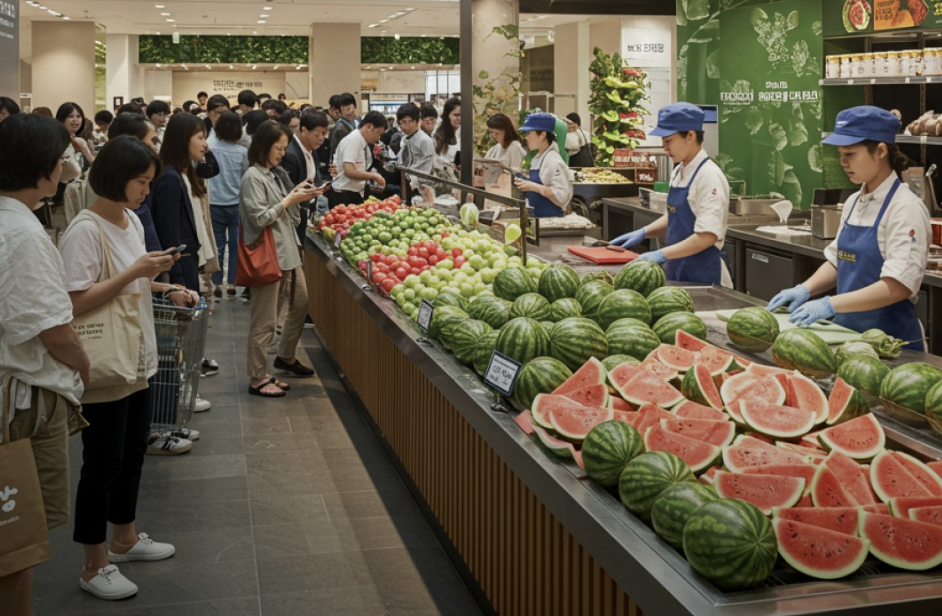"I don't mind the wait," Yoon said. "When you have a small child, any little help is worth it."
At 2:30 p.m. on Sunday, a line of over 100 people trailed behind Yoon. As new customers approached, an employee routinely asked, "Are you here for the fruit cutting service? Have you checked the waiting time? It's currently a few hours."
The employee's warning wasn't an exaggeration. A nearby sign announced an estimated wait time of 2 hours and 40 minutes.
For many, convenience outweighs the long wait. Yoon explained that watermelon rinds usually fill more than half of a 5-liter garbage bag. Buying pre-cut watermelon eliminates this hassle.
Long lines are a common sight at Hyundai Department Store in Seoul, primarily for luxury handbags or pre-cut fruit through their Fresh Table service. This service, the first of its kind in South Korea, cuts fresh fruits and vegetables in-store. Customers purchase their produce, buy a container if needed, and then bring their receipt to the Fresh Table counter for cutting.
According to Hyundai Department Store, weekend wait times range from two to three hours, sometimes longer, prompting many customers to secure online queue tickets. Staff at each branch cut 600 to 700 watermelons daily.
 |
Customers queue for the Fresh Table service in Seoul, South Korea. Photo: Korean |
Customers queue for the Fresh Table service in Seoul, South Korea. Photo: Korean
Bo-min, 40, a repeat customer, appreciates the customized cutting options. She usually requests half of her watermelon cubed and the other half in large slices. She learned this tip from an online mothers' group, explaining that smaller pieces release water too quickly.
Hyundai Department Store executives say the Fresh Table service is particularly popular with families with young children and those living alone, who value convenience and struggle with bulky food waste.
Fruit and vegetable sales have doubled at branches offering Fresh Table. Pre-cut watermelon is packaged in multiple containers.
Hyundai isn't the only retailer capitalizing on this trend. Across South Korea, convenience stores, local fruit stands, and online grocers are offering smaller portions of pre-cut fruit, catering to single-person and two-person households.
Jang Hye-jin, 29, who lives alone, rarely buys whole fruits. She occasionally orders small pre-cut packs from a local store. "It's more expensive, but also more economical in the long run," she said.
Shinsegae's Emart24 convenience store chain recently partnered with OROT to launch Pinkkio, a smart refrigerator stocked with single-serving portions of pre-cut fruit, currently being tested in select stores. This initiative reflects changing consumer habits, as more people live alone and prioritize convenience, driving demand for smaller fruit portions. According to Emart24 data, sales of single-serving fruit portions steadily increased during the second quarter.
Ngoc Ngan (Korea Herald)












